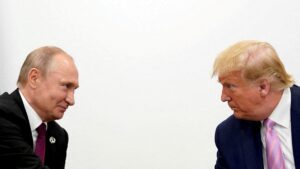Understanding the Nuances of U.S.-Russia Relations: Insights from Dan Quayle
In the ever-evolving landscape of international politics, few topics are as pressing and complex as U.S.-Russia relations. Former U.S. Vice President Dan Quayle, now chairman of Cerberus Global Investments, offers a unique perspective on this critical issue, especially in light of the ongoing conflict in Ukraine. Recent statements made by Quayle at the CNBC CEO Council Summit in Arizona shed light on the current geopolitical climate and provoke further discussion.
The Ongoing Conflict: Is There an End in Sight?
Quayle’s evaluation of the war in Ukraine is stark. He asserts that "we are not approaching the end," emphasizing that Russian President Vladimir Putin is unlikely to halt aggression until Ukraine is effectively dismantled. This pessimistic view invites us to examine the underlying motivations driving both sides in this tense standoff.
At Extreme Investor Network, we believe understanding these motivations is crucial for investors and policymakers alike. It’s not just about immediate outcomes but also about the long-term strategies in play. Quayle highlights a significant point: Putin’s KGB background may afford him a keen understanding of leverage in international relations, particularly with figures like former President Donald Trump.
The Complexity of Trump’s Relationship with Putin
Perhaps most intriguing is Quayle’s critique of Trump’s approach to Putin. Describing Trump as a "dealmaker" with little leverage to impose on the Kremlin, Quayle poses a pivotal question: What strategies are truly being considered? While Trump continues to express hope for a ceasefire, the effectiveness of such statements remains dubious. Quayle argues that a lack of pressure on Russia undermines U.S. alliances, particularly with the European Union, which could impact future geopolitical stability.
Unique Insights for Investors
Investors should take note: an unstable geopolitical environment often leads to market volatility. Understanding these intricacies means recognizing that pressure—be it financial or military—can shift power dynamics, affecting global markets. For example, potential sanctions or military support could lead to significant fluctuations in energy prices, manufacturing, and global supply chains.
A Call for Strategic Action
Quayle’s recommendations for bringing about a resolution include significant monetary support for Ukraine, increasing military aid, and enforcing secondary sanctions on Russia. These methods highlight the role of financial power in diplomacy. At Extreme Investor Network, we advocate the idea that economic measures can be just as effective as military strategy in altering national behaviors.
By continuing to engage with this situation and demanding accountability from leaders, investors can align their portfolios with the emerging realities of international relations.
The Future: Risks and Opportunities
Quayle’s thoughts extend beyond immediate concerns; he warns against a potential “domino effect” in Eastern Europe should Putin’s ambitions go unchecked. The former vice president underscores a critical risk: the perception of American failure could have far-reaching political consequences. Understanding these risks is vital for informed investment strategies.
As the landscape continues to shift, those in the investment community must remain vigilant. The changing tides of international relations can create both obstacles and opportunities, urging a recalibration of our financial and strategic approaches.
Beyond Geopolitics: The Bigger Picture
While geopolitical considerations dominate the conversation, we must also assess the implications for global trade. Quayle’s comments regarding tariffs and the complex relationship with China remind us of the interdependence that characterizes today’s economies. As he states, complete decoupling is impractical; yet companies are actively seeking alternatives. This trend could lead to significant shifts in supply chains and market strategies, presenting new avenues for investment.
Conclusion: Stay Informed and Engaged
Navigating the complexities of foreign relations is not merely the responsibility of politicians; it’s a shared concern that impacts everyone, including investors. At Extreme Investor Network, we encourage our readers to stay informed about international developments. The insights shared by Dan Quayle serve as a reminder that understanding these issues not only helps illuminate the present landscape but also shapes our strategies for the future.
For exclusive insights and analyses on global economic trends, be sure to follow our updates at Extreme Investor Network. Stay engaged, and let’s navigate these turbulent waters together.

